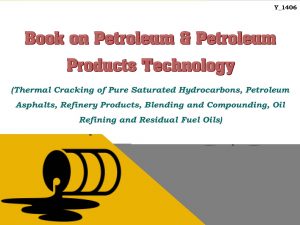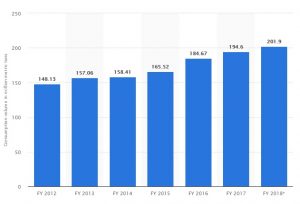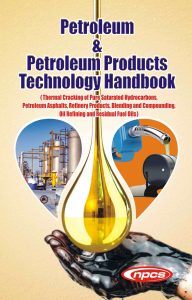Book on Petroleum & Petroleum Products Technology

Book on Petroleum & Petroleum Products Technology (Thermal Cracking of Pure Saturated Hydrocarbons, Petroleum Asphalts, Refinery Products, Blending and Compounding, Oil Refining and Residual Fuel Oils)
Petroleum products are materials derived from crude oil (petroleum) as it is processed in oil refineries. Unlike petrochemicals, which are a collection of well-defined usually pure chemical compounds, petroleum products are complex mixtures. The majority of petroleum is converted to petroleum products, which includes several classes of fuels.
Consumption Volume of Petroleum Products in India from FY 2012 to FY 2018 (in million metric tons)

Petroleum asphalt is a sticky, black and highly viscous liquid or semi-solid that is present in most petroleum crude oils and in some natural deposits. Petroleum crude oil is a complex mixture of a great many different hydrocarbons. Petroleum asphalt is defined as that part of crude oil which is separated from the higher-boiling hydrocarbons in crude oil by precipitation upon the addition of lower-boiling hydrocarbon solvents such as propane, pentane and hexane or petroleum asphalt. The precipitated material consists of asphaltenes which have an average molecular weight of about (800 – 2500 g/mole) and exist in the form of flat sheets of polyaromatic condensed rings with short aliphatic chains.
The major raw materials for petroleum asphalt are crude oil. Fluctuations in the price of crude oil will impact on the production cost of petroleum asphalt. The production cost of petroleum asphalt is also an important factor which could impact the price of petroleum asphalt.
The global Petroleum Asphalt market is valued at 48800 million US$ in 2018 is expected to reach 82000 million US$ by the end of 2025, growing at a CAGR of 6.7% during 2019-2025. Petroleum asphalt has two grades, which include paving petroleum asphalt and industrial petroleum asphalt. And each type has different application people and places relatively. With versatility of petroleum asphalt, the downstream application industries will need more petroleum asphalt products. So, petroleum asphalt has a huge market potential in the future.
Oil Refining
The oil refining process is the central activity of downstream oil and gas companies. In the refining process, crude oil is refined to produce different petroleum products like gasoline, diesel, and jet fuel. For the conversion to take place, crude oil is heated and introduced into the distillation tower. In the tower, oil is broken down into various petroleum products.
Rising demand for oil and energy globally is the prime factor driving the market growth. Rapid industrialization and urbanization in emerging economies is fueling the market demand. Increase expenditure towards refurbishment and construction of oil refining units is expected to foster the market growth the in forecasting period. Technological advancement towards high efficient oil refining machineries to meet the industry standards is presumed to augment the market growth in upcoming timespan.
Global Oil Refining Market is poised to cross USD 7 Trillion by 2024. Increasing investment toward the refurbishment, upgradation and expansion of existing refinery facilities will propel the oil refining market growth.
Amongst others, Reliance Industries Ltd., Saudi Aramco Lubricating Oil Refining Company, Essar Oil Limited, National Iranian Oil Company, Petroleos de Venezuela SA, National Iranian Oil Company, Kuwait Petroleum International, Total Oil, Hindustan Petroleum Corporation Limited, Exxon Mobil, ENI, Conoco Phillips, China National Petroleum Company, Chevron Corporation, and Abu Dhabi Oil Refining Company are the renowned players in the international oil refinery market.
Residual Fuel Oils
Residual fuel oil is one of the lowest-value petroleum products from a refinery. It is essentially a by-product of producing the light products that are the primary focus of a refinery. The primary end use for residual fuel oil is as a fuel in simple furnaces such as power plants and industrial boilers.
The primary end use for residual fuel oil is as a fuel in simple furnaces such as power plants and industrial boilers. It is also the primary fuel used on ocean-going ships, where it is called bunker fuel. Residual fuel oil is the heaviest among a range of different fuel oil grades.
The fuel oil market size is expected to decline at a CAGR of 4.08 percent by 2020. Health and environmental concerns related to the high sulfur content of residual fuel oil have led to new policies and regulations that have significantly lowered expectations for future residual fuel oil use globally. The share of the petrochemicals sector is forecast to increase from the current 13 percent to 15 percent by 2040.
NI528_Petroleum & Petroleum Products Technology Handbook (Thermal Cracking of Pure Saturated Hydrocarbons, Petroleum Asphalts, Refinery Products, Blending and Compounding, Oil Refining and Residual Fuel Oils)

About the Book:
Author: NPCS Board of Consultants & Engineers
Format: Paperback
ISBN: 9788193733912
Code: NI528
Pages: 440
Indian Price: Rs. 1,875/-
US$: 150-
Published: 2019
Publisher: NIIR PROJECT CONSULTANCY SERVICES
Petroleum asphalt is a sticky, black and highly viscous liquid or semi-solid that is present in most petroleum crude oils and in some natural deposits. Petroleum crude oil is a complex mixture of a great many different hydrocarbons. Refined petroleum products are derived from crude oils through processes such as catalytic cracking and fractional distillation. Refining is a necessary step before oil can be burned as fuel or used to create end products.
Residual fuel oil is a complex mixture of hydrocarbons prepared by blending a residuum component with a flux stock which is a distillate component diluent, to give the desired viscosity of the fuel oil produced. Petroleum refining is the process of separating the many compounds present in crude petroleum. An Oil refinery or petroleum refinery is an industrial process plant where crude oil is processed and refined into more useful products
The global Petroleum Asphalt market is valued at USD 48.8 Billion in 2017 and is expected to reach USD 77.67 Billion by the end of 2024, growing at a Growth Rate of 6.87% between 2017 and 2024.The global bunker fuel market was valued at $137,215.5 million in 2017 and is expected to reach $273,050.4 million by 2025, registering a CAGR of 9.4% from 2018 to 2025.
Some of the fundamentals of the book are composition of radiation effects on lubricants, thermal cracking of pure saturated hydrocarbons, petroleum asphalts, refinery products, refinery feed stocks, blending and compounding, oil refining, residual fuel oils, distillate heating oils, formulations of petroleum, photographs of machinery with suppliers contact details.
A total guide to manufacturing and entrepreneurial success in one of today’s most lucrative petroleum industry. This book is one-stop guide to one of the fastest growing sectors of the petroleum industry, where opportunities abound for manufacturers, retailers, and entrepreneurs. This is the only complete handbook on the commercial production of petroleum products. It serves up a feast of how-to information, from concept to purchasing equipment.
See more











